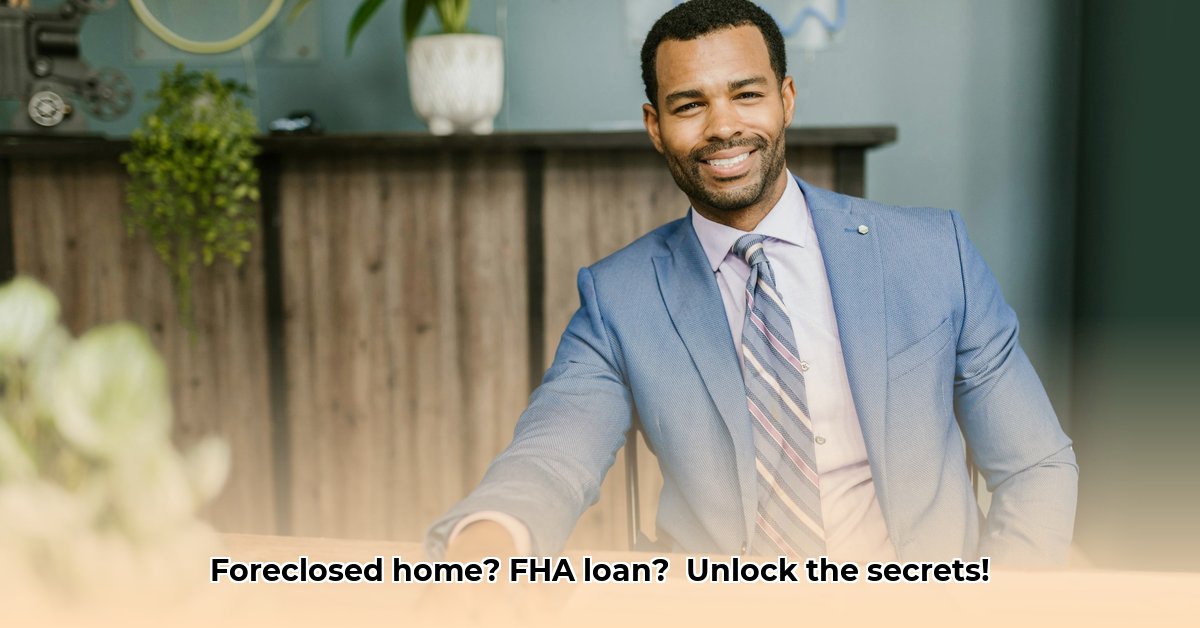
Buying a foreclosed home can be a smart financial move, offering potential savings compared to purchasing a home on the open market. And using an FHA loan can make the process more accessible, even for first-time homebuyers. This guide provides a step-by-step walkthrough, demystifying the process and empowering you to make informed decisions. For more information on home equity loans, check out this resource: learn more.
Understanding FHA Loans and Foreclosed Properties
First, let's clarify what an FHA loan is and what makes a foreclosed property unique. An FHA loan (Federal Housing Administration loan) is a mortgage insured by the FHA, reducing the lender's risk. This means you might qualify for a loan even with a lower credit score than required for conventional mortgages. A foreclosed property, on the other hand, is a home repossessed by a lender after the previous owner defaulted on their mortgage. These often sell below market value, presenting a significant opportunity for buyers.
Qualifying for an FHA Loan on a Foreclosed Home
Several factors determine your eligibility for an FHA loan on a foreclosed property. Lenders carefully assess these to ensure your financial stability and the property's suitability:
Credit Score: A higher credit score (ideally above 580) significantly improves your chances of approval and often leads to better interest rates. A good credit history demonstrates responsible financial management. Is a credit score above 600 necessary for an FHA loan on a foreclosed property? While not strictly required, it dramatically increases your chances of approval.
Down Payment: The required down payment depends on your credit score. With a credit score of 580 or higher, a 3.5% down payment is typically sufficient. A lower score (between 500 and 579) generally requires a 10% down payment. Saving for this initial investment is a crucial first step.
Debt-to-Income Ratio (DTI): Your DTI compares your monthly debt payments to your gross monthly income. A lower DTI demonstrates your ability to manage existing debt while taking on a new mortgage. What's a healthy DTI for an FHA loan? Generally, lenders prefer a DTI below 43%, although this can vary.
Home Appraisal: An FHA-approved appraiser assesses the property's value and condition to ensure it meets minimum safety and habitability standards. This protects both you and the lender. Does the property need to be perfect? No, but significant repairs might need to be addressed before loan approval.
A Step-by-Step Guide to Buying Your Foreclosed Home
Buying a foreclosed home with an FHA loan is a structured process. Follow these steps for a smoother experience:
Pre-Approval: Secure pre-approval for your FHA loan. This demonstrates your seriousness to sellers and provides a clear budget. Pre-approval is crucial, as it shows you are a qualified buyer.
Property Search: Partner with a real estate agent experienced with foreclosures to find properties matching your needs and budget. Consider the potential need for renovation.
Inspection & Appraisal: Thoroughly inspect the property for any needed repairs. The FHA requires an appraisal to validate the property's value and condition. A thorough inspection and appraisal are vital in avoiding unforeseen expenses and delays.
Negotiate Your Offer: Make a competitive offer, considering factors like the property's condition and market trends. Your real estate agent will be invaluable in this stage. Negotiating the price and terms requires careful consideration.
Loan Application & Underwriting: Submit your complete loan application with all the necessary documents. The lender will review your application and the appraisal. Gather all requested documents to help streamline the process.
Closing: Once everything is approved, prepare for closing costs and complete the final paperwork. This is the day you'll receive the keys to your new home. Celebrate responsibly!
Weighing the Pros and Cons: Is an FHA Loan Right for You?
Before proceeding, carefully weigh the pros and cons:
| Pros | Cons |
|---|---|
| Lower down payment requirements | Stricter property condition requirements |
| Easier qualification than some conventional loans | Potentially higher interest rates compared to conventional loans, depending on your credit and the property |
| Access to properties often unavailable to cash buyers | Increased paperwork and potentially longer closing times compared to cash purchases |
| FHA 203(k) loan option available for renovations | Higher competition from cash buyers, who can often make quicker offers |
Final Thoughts
Buying a foreclosed home with an FHA loan is an achievable goal, but thorough planning and expert guidance are essential. The process involves several steps, so seek advice from experienced real estate agents and mortgage lenders to navigate the intricacies efficiently. Remember, due diligence and a strategic approach will yield the best results.
Key Takeaways:
- An FHA loan provides an accessible pathway to homeownership, even for those with less-than-perfect credit.
- Foreclosed properties present opportunities for significant savings but require careful assessment of their condition.
- Understanding and adhering to FHA guidelines is crucial throughout the process.
- Working with a skilled team of professionals — real estate agents, mortgage lenders, and inspectors — will streamline the process.
- Thorough research and planning are critical to navigate competitive bidding and potential repair costs.